#types and causes of Hernia
Explore tagged Tumblr posts
Text
was talking about isekais because i realized i wanted to write one of those classic like, ur pro hero shouto's gf and some quirk accident causes shouto from another universe to be transported to yours type of drabbles. and what do u know, it's fantasy au prince shouto, and he is immensely attached to u because u look exactly like the servant girl he's in love with back home and he inherently trusts u and he can't help but do courtly shit like kiss ur hand etc etc. and the whole time ur just like uhhhhhhhh buddy i am full of microplastics but also u cannot help the way it makes your heart flutter because it's shouto. meanwhile your shouto is getting increasingly, obviously, pettily jealous of his own self and u need to find a way to send this guy back stat before he either gives himself a hernia or does a small lil murder
697 notes
·
View notes
Text
extracurriculars I think Sam did ranked by how much turmoil they caused in family
- track. considered silly but ultimately harmless bc hey, at least he's getting exercise. dean goes to his meets and heckles the other team and is generally extremely annoying and sam rolls his eyes but also maybe secretly smiles abt it when nobody's looking
- mathletes. Also pretty harmless bc dean and john both think it's hilarious and kind of adorable but dean literally can't stop giving him shit for it and eventually sam is like sorry I'm not a dumbass who flunked 11th grade and they hurt each other's feelings a little
- model un ('yeah Sam wants to go on a field trip. '(It's a conference!)' 'oh I'm sorry apparently it's a conference. yeah he's gonna pretend to be France. yeah the country.') John thinks this is really bizarre and he hates how much time it takes and he's like Sam this is nonsense and Sam's like omigod dad u r LITERALLY ruining my life 😤!! My team NEEDS me.
- debate team. Sam is absolutely the type of kid to learn all the logical fallacies and start bringing them up in arguments and it makes Dean want to STRANGLE him. 'That's post-hoc rationalization.' 'Gesundheit.' they have a massive scream fight about this.
- our town. Dean is like Sam you might not realize this but if u do theater. Ppl might think you're. And Sam is like think I'm what 🤨 and Dean is like oh never mind. but frets and squirms abt it so bad he almost gives himself a hernia and starts campaigning to get Sam a girlfriend. when Sam tries to beg out of a hunt so he can do tech week he and John have this enormous blowout fight where John calls Sam selfish and Sam is like mom would want me to have a NORMAL LIFE and nothing is ever quite the same again
346 notes
·
View notes
Note
You always seem to be stuffing yourself to the brim. It's hard to believe you're human, sometimes. Sorry if this is intrusive, I know you don't do that type of content, which is fine, BUT I AM CURIOUS:
do you ever feel sick? I was looking at your recent posts and like, surely 4 dinners and such a tightly packed tummy would have you feeling nauseous or maybe a little nervous?
Do you ever have any actual fear that your meals will come back up, or are you just always in 'normal' pain from being so full? and, if you feel up to it, don't feel shy about mentioning in your future posts whether or not you were on the verge of losing it or not. I wanna know just how far you're pushing yourself.
I’ve just been at it for a long time now, but sometimes I kinda shock myself with how much I’m able to eat in a sitting 😬
Honestly even when I’m packed to the brim, I’m only nervous that like I’m gonna tear something into a hernia or something so I try to take it easy on the getting up and everything.
But that’s only with food, the only times I’ve actually gotten sick was because I packed myself to the brim and got super drunk as well. So that’s why I don’t do beer content all that much cause it’s not frequent but sometimes it can happen 😁
92 notes
·
View notes
Text
Eclipse the kitten update
(please don't glitch tumblr it's the tenth time I've tried!!!)
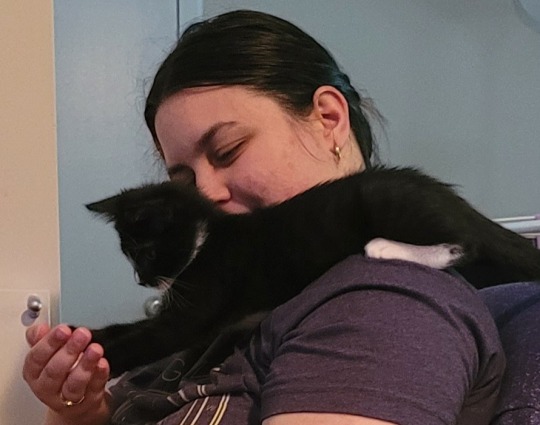
Previous post
Welp! Winter's boy has a respiratory infection. It was causing him to wheeze so to the vet we went! Luckily it wasn't a diaphram issue (which had us worried because of his umbilical hernia). His hernia also came up normal on his x-rays.
(X-rays left out because might bother people, but I can send them on request)
He's on meds several times a day and taking them like a champ, but had to be put in a pen with limited free playtime (because nothing will stop Mr Indestructible from running around the house with all the grace of a car with no breaks). We DID get a reply after just a week from a really nice person who was going to give us one (shocked us let me tell ya because it was BIG dog sized). Unfortunately, they left it outside for us to pick up and someone else just... took it. Right out of their yard. And since all we had was a small cat carrier to keep him in (which was kinda cruel for more than a day or two tops), we ordered a cat playpen that we got for a decent price. We kept looking until it got here, but no luck. Still! It's a nice playpen and we have it set up so he doesn't have to jump if he doesn't want to (plus more vertical to enjoy later on). Sarah's mom also let us borrow her water fountain!
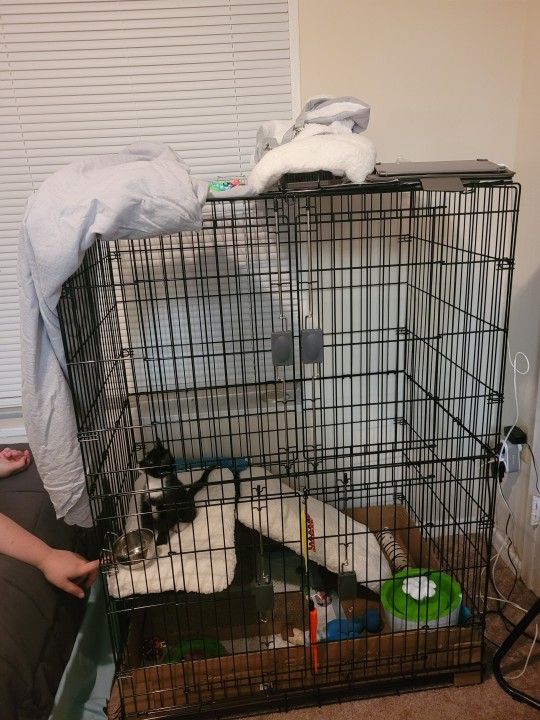
We went to a new vet as ours was booked up (and he had already been wheezing a day). Everyone basically fell in love with him instantly. He left with a little toy from the tech, they gave Winter a jar of honey (one of the people in the office has bees and they wanted to give her something for caring about a kitten that most wouldn't have despite him having a treatable condition), and they've been checking in on how he is recovering (very well since I first typed this actually). He's basically got an entire vet office wrapped around his little paw.
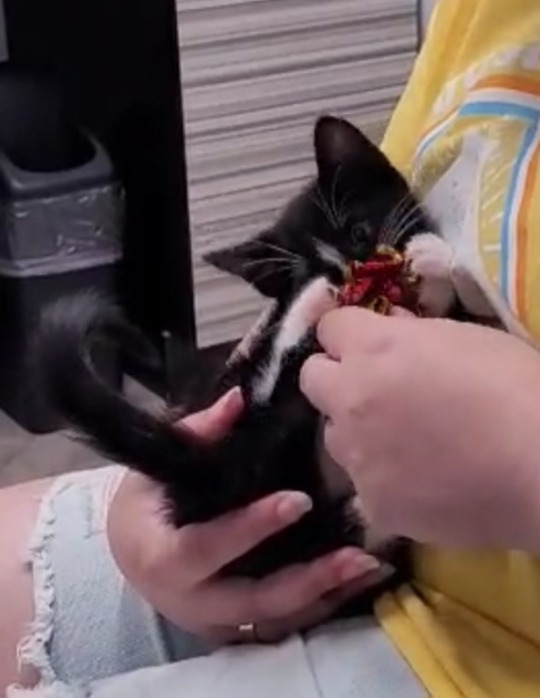
Also, the non-profit we're taking him to for his surgery had a cancelation and his got moved up to the 12th! Counting down the days yall.
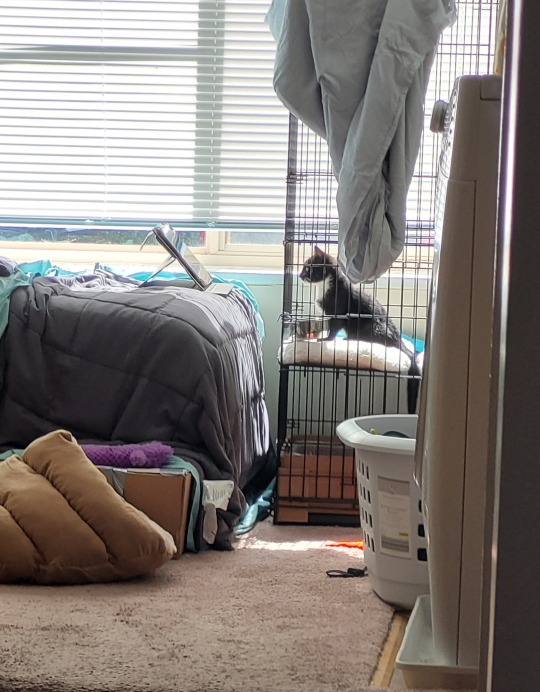
Because I gotta kinda mention it, this hit us where it hurts. Between the vet visit and testing, the pen, and the estimated cost for the surgery and followup, it's gonna cost us more than $2k (as long as nothing ELSE goes wrong). We're lucky that we're all super careful with our money, but there's only so much we can save up with three people below the poverty line. Still worth it though. I mean, look at this doofus
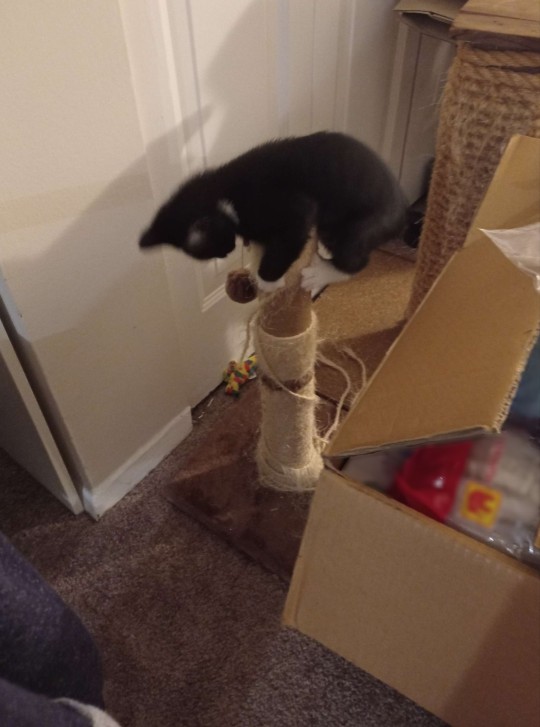
He is so stubborn that we can't leave scratch posts upright because he keeps doing THIS! XD
I'm linking Winter's paypal, but I 1000% understand if you can't help out. Still, a reblog and a word or three mean a LOT to all of us so if you got a minute, I'd love some new post additions to show Winter.
(Truth be told, the only reason all the updates are posted on my tumblr is because I'm the longest winded out of the three of us and I take like 5 billion pictures. XD )
Speaking of, there WOULD be a bonus pic of him and his sister (Melanite, aka Miel) playing under my chair as my cat (Danny) looks on from a safe place, but tumblr kept glitching when I added it.
Edit: surgery update
#cats#kitten#eclipse the kitten#umbilical hernia#respiratory infection#sick pets#pet illness#pet surgery mention#vet bill#finances#pet expenses#vet#tumblr glitch
106 notes
·
View notes
Text
Fairy Tail 100 Years Quest episode 16: thoughts + opinions
Tired Touka
look at Makarov's pose lol

how does Juvia manage to look so beautiful even when she's knocked out cold??

it's still so funny to me that Cana got super drunk to the point of passing out and then just went along with everyone who was under the White Mage/Faris' control lmao
how the fuck was Faris able to drag out both Jellal and Max without getting herself a hernia? I KNOW I WOULD'VE CERTAINLY GOTTEN ONE IF I WERE IN HER SHOES AND DIDN'T HAVE FLOATING MAGIC AT MY DISPOSAL!
I love how she just gets progressively more upset the heavier members of Fairy Tail get when she attempts to drag them out

I might hate her guts for all the shitstorm she's caused so far, but Faris was actually smart for utilizing her magic and making Elfman carry both Laxus and Nab

I love Natsu using his big bro's curse as a way to take down one of Aldoron's God Seeds, with that being an actually smart move from him for once! also, him calling Zeref his big brother is so sweet and wholesome🥹🥹🥹
these two 💙 // eeek, I'm so hyped up for the next episode (my fellow Gruvia and Jerza shippers, iykyk!)

cannot wait for Jellal and Erza's conversation about what happened between them when he was under the White Mage's control lmao
''Who could've done this?'' // WELL GUESS WHAT JELLAL? THE GUY RIGHT IN FRONT OF YOU DID THIS TO THE LOVE OF YOUR LIFE! (albeit under the White Mage's control, but still lol)
Jellal, sweetie, I'm pretty sure being restrained is child's play compared to what Laxus had to endure in his fight against Erza
well, God Seed Aldoron sure is one ugly-looking motherfucker

oof, Natsu looks so hot here❤️🔥❤️🔥❤️🔥

why does blood in Fairy Tail always look more like chocolate than real blood?


GODDAMMIT, THIS WAS SUCH A MISSED OPPORTUNITY FOR GRAY AND JUVIA TO DO A UNISON RAID!
''Are you the one who hurt Erza?'' // well, looks like Jellal's getting ready to be a bad boy again, and for Erza only😏😏😏
THIS GOD SEED DOOM IS SUCH A GOOFY GOOBER
Cobra would be so proud of Kinana for using a similar type of magic to his! 💜
I really loved the fight between Doom and ''less important'' Fairy Tail members! Great to see them shine for once, instead of being useless background characters they unfortunately seem to be most of the time. 🙌🏻

Look, I really loved this episode, but please tell me I'm not the only who noticed Gajeel's voice sounding really off in this episode? I really, really hope they didn't axe David Wald (Gajeel's English VA) because he aired Crunchyroll's dirty laundry on Twitter a couple of weeks ago (tldr: they took care packages and fan letters addressed to voice actors and distributed them amongst the employees instead of giving them to VA's, and they also allegedly committed a federal crime by opening mail).
My fellow Gruvia and Jerza shippers, we should be well fed in the next episode, because Gray & Juvia vs. Metro and Jellal vs. Gears are both shaping up to be amazing fights + WE SHOULD GET SO MUCH GRUVIA AND JERZA CONTENT, SO I'M BEYOND PUMPED FOR IT!
#helena watches fairy tail 100 years quest#fairy tail#fairytail#fairy tail 100 years quest#fairy tail 100 yq#ft 100 years quest#ft100yq
13 notes
·
View notes
Text
bout to rip my hair out cause every name I pick for this character is bad.
hercynia: can’t type it correctly ever. evokes hernia and yersinia pestis
hephrynia: not a name, completely made up. a little too distinguished. elegantly weird and I don’t want the elegance
iphigenia: slaps as a name, but then this character’s fun journey with dad almost has to involve him trying to human sacrifice her. compelling, but there’s enough going on already
#whimsy 3? this isn’t immovable gyre but it doesn’t have a title because the character DOESNT HAVE A NAME YET#ig tag
16 notes
·
View notes
Text
Anyways. I've been seriously considering getting help specifically for my dissociation. There's actually a therapist that specializes in my type of trauma not even 5 minutes from where I live, and he specializes in C-PTSD and dissociation. I still don't know if I have DID, I can't ever be too sure, but at the very least I just want some answers. I want to start figuring things out, especially recently. Over this year I've experienced complete memory voids, confusing my dreams with reality, I got my car towed due to my own negligence, can't even focus at work to get all my tasks done. I even called out again today because the fog, I just can't handle it
I think my main stressor this year has been my physical health. I'm still recovering from broken ribs, and I very recently had a very brief tumor scare. I had this mass on my stomach that I thought was a hernia, go to find out it's swollen lymph nodes. Immediately got scanned for tumors or cancers but nope, everything looks normal. The likely culprit is a lower back injury causing my lymphatic system to react. Makes sense since I've been dealing with symptoms of a herniated disk for about a year now. I split my knee this year as well, just a whole bunch of very intense injuries. Aside from my physical health I think it's just money as well that's stressing me. I've been broke broke, like I've never been this broke before. Seeking help is maybe possible but I'd only be able to go maybe once a month, which isn't ideal but at least it's something. As soon as my next paycheck rolls in I'm gonna call and see how much an appointment is, thankfully I still have insurance.
2 notes
·
View notes
Text
The Best Hernia Surgeon in Delhi NCR
Exploring Surgical Excellence in Dwarka, West Delhi
Hernias are a common medical condition that can cause significant discomfort and lead to serious complications if left untreated. For residents of Delhi NCR, including the rapidly growing region of Dwarka in West Delhi, finding a skilled hernia surgeon is crucial. This guide delves into the various types of hernia surgeries available, their advantages and disadvantages, and offers insights into selecting the best surgeon in the area.
If you're seeking the best hernia surgeon in Delhi NCR, look no further than Dr. Arun Bhardwaj. Renowned for his expertise and compassionate care, Dr. Bhardwaj stands out as a leading laparoscopic and hernia surgeon in the region. With years of experience and a commitment to delivering outstanding patient outcomes, he is dedicated to ensuring a smooth and successful recovery for every patient.
Types of Hernia Surgery
Hernia surgery can be performed using various techniques, depending on the type and severity of the hernia. The main types of hernia surgery include:
Open Hernia Repair: Traditional surgery where an incision is made to push the herniated tissue back into place and reinforce the weakened area with a mesh.
Laparoscopic Hernia Repair: A minimally invasive technique where small incisions are made, and a laparoscope (a thin tube with a camera) is used to guide the repair. This method often results in less pain and quicker recovery.
Robotic Hernia Repair: A variation of laparoscopic surgery, using robotic-assisted technology for greater precision and control during the procedure.
#best bariatric surgeon in delhi ncr#best laparoscopic surgeon in delhi ncr#bariatric surgery in delhi ncr#weight loss surgery in delhi ncr#best hernia surgery doctor in delhi ncr#best hernia surgeon in west delhi#weight loss in delhi ncr
1 note
·
View note
Note
Hello 🙂 Just wanted to say hi and check in. Hope you've been well lately ❤️
Honestly? I’m currently trying to do 36 hours of work in 24. My husband had hernia surgery (and we didn’t have insurance) so it took out all our savings.
- But I’m not complaining. I feel fortunate that I had the money. Now I just have to work twice as much to rebuild that savings.
AND I’m doing it in a sustainable way. 💜 We may not rebuild as fast, but I’m still allowing myself to get a massage every month and get structural integration work. I go to free yoga sessions run by one of my coworkers who’s currently training to be a yogi. I allow myself one night a month to go to the dark temple and learn more about bdsm/kink. I take nights to hang out with friends. And, of course, I make sure to spend quality time with my daughter (nonverbal, now preverbal autistic - she’s starting to say words, ya’ll, and interacting 🥰 My heart is so full).
I’m still writing, albeit some days it’s only for 15 min, but I’m encouraged by keeping up with it. I’m not taking commissions cause right now I’m actually finishing one about a radiologist with skeleton husbands (expect chapters of that deliciousness out soon) and about to start another that’s the sequel to Horrortale (a very different type of deliciousness).
I wish I could sustain myself on getting commissions, but I have to be realistic: I’m dyslexic, ADHD, Autistic and I have a family I need to provide for (and currently in a very well paying job I’ve put in over a decade of my life to reach). I don’t write fast. I never have. This post right here will take me 20 min - yeah, I know “WHAT?!?” But I spend a lot of time thinking about my words, and I like to think that’s why people like my writing ^_^ It’s why I like my writing. I re-read my stuff all the time, and I’m like, “fuck yes.” I love it. And I love that you all love it.
- This was probably not the response you were expecting. But I do want to tell you again that your blog truly is a wonderful bright spot. I have used it now more than once this week to unwind and take a 15 min break from the whirlwind of my busy but happy life. Thank you. 💜
#ask#cerys talks#making it work#sustainable hustle#live life in all its moments#it’s not work if you enjoy it - ha ha - I say that but it’s true. I love my job. I can look at what I do and know I’m making a difference…#then I write smut and know I’m making a difference… in your pants 🤣 and that’s the other side of me. I love it.#love yourself#be yourself#thank you for checking in#thank you for the light
5 notes
·
View notes
Text
hysterectomies, removal of ovaries, removal of cervixes, etc cause premature menopause, which correlates with a lot of other aging factors such as hormone imbalances (esp low estrogen levels if ovaries are removed, and that's what would be needed to get pregnant as well), weight gain, changes in body proportions (fat carried on the belly most common as that is the post-menopausal and male pattern), loss of energy, depression, difficulty sleeping, hot flashes, memory issues, bladder problems, and pelvic floor laxity. surgeries always carry risks such as scar tissue that implodes or stretches over time and swelling of organs and limbs. and with something like organ removal from the abdomen, you are cutting through ligaments, muscles, and tissues that rarely heal properly. just ask a woman who gets a c-section, has hernias from childbirth, or has ligament/muscle problems in the abdomen, pelvic floor, and back just from carrying and delivering a child.
women's ligaments, muscles, and tissues tend to be more flexible than men's due to the hormones, structures, and healing chemicals released after stress and injury. a transwoman carrying a child would be at heavy risk for worse scarring and slower healing. they would need to have drugs injected to eject the baby since their bodies don't make the chemicals for that type of muscle contraction.
(I'm not even sure how the bodies would nourish the baby; women's bodies already tend to miscarry if the environment innerly isn't up to carrying, and a male body with estrogen still wouldn't recognize pregnancy, and if it did through injections, there could be an autoimmune-type reaction.)
I can't believe it's 2025 and we still don't have a way for me to give my empty uterus to a trans woman who wants to carry a child
For Sale: Ace Womb, Never Used
16K notes
·
View notes
Text
The Anatomy of a Hernia: Understanding the Breakdown Before It Breaks You
What Exactly Is a Hernia?
At its core, a hernia is a structural defect. It happens when an internal organ or fatty tissue pushes through a weak spot or tear in the surrounding muscle or connective tissue, usually in the abdominal wall.
Think of it like a tire bulging through a weak point in the rubber. It’s not just a cosmetic issue it’s a sign that something underneath has shifted, and it won’t fix itself.
The Most Common Types of Hernias
While hernias can develop in several areas, these are the most commonly diagnosed types:
Inguinal Hernia: Appears in the groin area; more common in men
Umbilical Hernia: Forms around the belly button; seen in newborns and adults
Incisional Hernia: Occurs at the site of a previous surgical scar
Hiatal Hernia: Internal hernia where part of the stomach pushes into the chest cavity
Femoral Hernia: Appears in the upper thigh, more common in women
What Causes the Breakdown?
The causes of hernia formation are usually a mix of internal weakness and external pressure:
Weak Abdominal Wall: Congenital or age-related
Chronic Straining: During bowel movements, heavy lifting, or coughing
Obesity: Puts constant pressure on the abdominal wall
Previous Surgery: Surgical sites can weaken tissue integrity
Poor Posture & Core Health: Undermines structural stability
It’s a slow process; the wall weakens over time, and then one day, the pressure becomes too much.
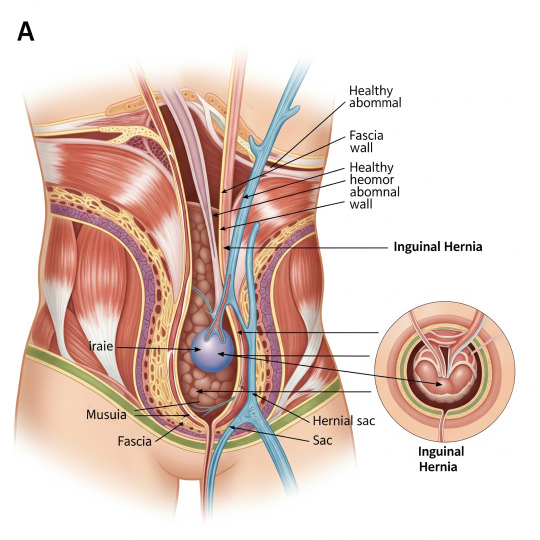
Why You Shouldn’t Wait
Here’s the uncomfortable truth: Hernias don’t heal on their own. Once the tissue pushes through, it either stays out or continues to enlarge. What starts as a small, painless bulge can quickly escalate into:
Chronic pain
Restricted movement
Intestinal blockage
Strangulation (cut-off blood supply a surgical emergency)
The longer you wait, the higher the risk and the more complex the surgery becomes.
The Surgical Fix: Restoring the Wall
Modern hernia surgery isn’t what it used to be. Especially in centers like Hernia Surgery Indore, the preferred method is laparoscopic repair using 3D mesh, which:
Reinforces the weak spot
Minimizes recurrence
Involves tiny incisions and faster healing
Allows patients to walk within hours and resume work within days
It’s safe, effective, and low-risk when done early by a trained specialist.
Prevention is Real
Can you prevent a hernia? To an extent, yes:
Strengthen your core (yoga, pilates, functional fitness)
Avoid chronic constipation and straining
Lift weights with proper technique
Manage body weight and posture
Treat persistent coughs or chronic respiratory issues early
But if the structural weakness already exists, lifestyle alone won’t reverse it. Early diagnosis and surgical correction are the only real solutions.
Final Words
A hernia may not scream for attention at first. But internally, it’s your body waving a red flag. Understanding how it forms and why empowers you to act before it becomes unmanageable.
So if you’ve noticed a persistent bulge, pressure, or pain in your abdomen or groin, don’t ignore it. Learn more or consult with trusted experts like the team at Hernia Surgery Indore. Early action leads to better outcomes.
Because the longer you wait, the more it breaks you, not just your body, but your routine, your comfort, and your peace of mind.
1 note
·
View note
Text
Hernias can cause discomfort, complications, and even long-term health risks if left untreated. These occur when an organ or tissue pushes through a weakened area of muscle or fascia, often creating noticeable bulges or pain. While not all hernias require surgery, identifying the type and understanding potential treatment options is essential to taking the right steps for your health. For residents seeking services of hernia repair in Baltimore, professional surgical solutions can help alleviate pain and prevent further complications. Here, we break down the common types of hernias and discuss which ones might benefit from surgical repairs. Learn more - https://bornbybits.com/different-types-of-hernias-and-which-ones-require-surgical-repair/
0 notes
Text
Understanding Small Parts Sonography: A Simple Guide for Better Health By New Life Radiology Center, Thane
When we think of ultrasounds, we often imagine scans related to pregnancy or the abdomen. But there’s another type of scan that’s equally important—Small Parts Sonography Treatment. It may not sound very familiar, but it plays a key role in diagnosing health issues related to small, soft tissue structures in our body.
Let’s break it down in a simple way and understand why this scan matters, how it helps, and where to get Small Parts Sonography Treatment in Thane done with expert care.

What is Small Parts Sonography?
Small Parts Sonography is an ultrasound scan used to examine the smaller organs and soft tissues of the body. These areas can include:
Thyroid gland
Scrotum and testicles
Breast tissue
Salivary glands
Lymph nodes
Soft tissue swellings or lumps
This scan is done using high-frequency sound waves that produce detailed images of these parts. The best part is, it’s non-invasive and does not involve radiation, making it safe and easy for people of all ages.
When Do Doctors Suggest Small Parts Ultrasound?
There are many situations where your doctor might suggest a Small Parts Ultrasound. If you feel a lump in your neck, breast, or underarms, or experience discomfort in the scrotum or swelling near the jaw, a usg small parts scan helps understand the cause.
This scan is useful in detecting:
Cysts or benign lumps
Infections or abscesses
Thyroid nodules
Inflammation in glands
Hernias
Testicular pain or swelling
Each of these areas needs careful evaluation, and this is where the scan helps doctors take the next step in treatment or observation.
What Happens During the Scan?
A small parts USG is simple and usually painless. The area that needs to be scanned is exposed, and a warm gel is applied to the skin. A handheld device called a transducer is moved gently over the area, capturing clear images that are viewed on a screen.
There’s no need for fasting or any special preparation unless the doctor advises otherwise. The scan usually takes around 15–30 minutes, depending on the body part being checked. At New Life Radiology Center, we make sure that the process is calm, quick, and respectful.
Who Should You Trust for Small Parts Sonography?
It’s not just about getting a scan—it’s about getting it done right. The quality of the scan largely depends on the skills of the radiologist reading the results. Many people search for the Best Radiologist in Thane when they want clarity and accuracy in their reports.
At New Life Radiology Center, Dr. Harish Pawar is known for his attention to detail and years of experience in radiology. His calm and patient approach helps people feel more comfortable, especially when they come in feeling anxious or unsure. Whether it's a thyroid scan or breast ultrasound, his sharp observation helps doctors make the right decisions.
Why Small Parts Sonography Should Not Be Ignored
Even though these scans deal with “small parts,” the findings can make a big difference. For example, a tiny lump in the neck might seem harmless, but a Small Parts Sonography Treatment can reveal if it’s a cyst, infection, or something that needs further attention.
Early detection is always better, and ultrasound helps do that without any pain or stress. At New Life Radiology Center, our goal is to help people understand what’s going on inside their body with clear and safe imaging.
Dr. Harish Pawar, with his strong experience in interpreting small part scans, plays a key role in giving patients the clarity they need. Whether it’s a thyroid issue, a swelling under the skin, or an unexplained lump, getting the right scan helps guide the next steps.
Small Steps for Better Health
Sometimes, we tend to ignore minor discomforts or small swellings, thinking they’ll go away on their own. But when something feels unusual in your body, getting a small parts USG can give important answers. It’s a small step that helps avoid bigger complications later.Many people in and around Thane now search for Small Parts Sonography Treatment in Thane to understand these symptoms early. If you’re someone who needs clarity about a lump or discomfort in any small area of the body, this scan can offer helpful insights.
1 note
·
View note
Text
Top 7 Benefits of Robotic-Assisted Hernia Repair
Hernias are among the common medical issues that affect people worldwide, causing a disruption in their day-to-day activities and reducing their quality of life. Surgery is the most effective, and often the only option to provide complete and long-term relief against the symptoms, and provide the patient with a comfortable life. While traditional open and laparoscopic methods of hernia repair surgeries have been around for decades, they bring with them a wide range of complications, including large incisions and a greater risk of post-surgical problems. However, within the past few decades, the field of surgery has evolved dramatically with the introduction of the most effective and advanced Robotic Hernia Surgery. In modern times, robotic-assisted hernia surgery offers a minimally invasive, highly accurate, and risk-free treatment to patients while significantly improving patient outcomes. With the fast-paced lifestyle of the modern world, and the responsibilities in hand, patients are not just looking for a treatment, but they are also seeking a treatment that offers minimum downtime, faster recovery, maximum safety and minimal scarring, so that they can return to their daily life activities as soon as possible. This is where Robotic-assisted hernia repair surgery stands out. In this article, we will discuss in detail the Robotic-Assisted hernia repair surgeries and the benefits offered by them.

What is Robotic Surgery for Hernia Repair?
Robotic Hernia Surgery in Mohali is the most advanced and highly popular surgical treatment option being used worldwide for the treatment of hernias. It is important to note that not all hernias might require treatment. However, if it is causing pain and other symptoms, causing discomfort to the patient, surgery might be the best option for the treatment. In such cases, robotic surgery is the latest advancement in the medical field, offering much more comfortable and risk-free surgeries, as compared to traditional open and laparoscopic methods. It creates small incisions, which means that the pain and discomfort associated with hernia repair surgery are significantly reduced. Robotic surgery can be used to treat all kinds of hernias, including Inguinal Hernia, Femoral Hernia, Umbilical Hernia, Hiatal Hernia, and Incisional Hernia. However, it should be noted that not all patients are candidates for Robotic Hernia Surgery, and it is up to the surgeon to decide whether the patient is fit for the surgery or not. Some common eligibility criteria that might be considered to check whether the patient is a fit for the robotic surgery are the overall health of the patient, the complexity of the case, the previous surgical history of the patient, and tolerance of the patient to anesthesia.
What are the benefits of Robotic Surgery for Hernia repair?
As discussed above, robotic surgery for hernia repair offers a wide range of benefits to the patients. Some of the most common benefits include:
Minimally Invasive: Robotic Hernia Surgery in Chandigarh is performed with the help of small incisions, typically in the abdomen of the patient. Hence, it is minimally invasive, resulting in less trauma to the tissue and almost invisible scars.
Enhanced Precision: The robotic system used in this type of surgery offers surgeons higher precision and greater scope of movement in the small spaces present between the internal organs of the human body, as compared to bare human hands.
Improved Visualization: The advanced robotic equipment provides a highly magnified and detailed 3-dimensional view of the surgical site and the hernia on a screen to the surgeon, so that they can view the site with greater clarity.
Faster Recovery: Robotic Surgery offers a much quicker and comfortable recovery as compared to traditional open and laparoscopic surgeries. As a result, patients can return to their daily life activities much sooner.
Less Pain: Since robotic surgeries for hernia repair require very small incisions, the extent of damage to the surrounding tissues is highly reduced, which results in less pain and increased degree of comfort for the patient. This enables a more comfortable and safer recovery.
Lower Risk of Complications: Robotic Hernia Surgery Near me also protects the patients against the potential risks of surgery, such as bleeding, infections, and damage to the surrounding tissues.
Lower Recurrence Rates: Robotic Surgeries offer the lowest recurrence rates as compared to other methods of hernia repair surgery.
If a patient has been advised for hernia repair surgery, it is of utmost importance for them to consult an expert hernia specialists so as to discuss the best treatment approach for them based on their specific case and lifestyle requirements. If you are looking for the Best hospital for Robotic Surgery in Mohali, or the Best doctors for hernia surgery, Sohana Hospital might be the best option for you. Sohana Hospital Mohali is home to the world’s most advanced robotic technology and North India’s most trusted and experienced Robotic Surgeons who provide the most comprehensive and holistic robotic excellence for all the surgical needs of the patients in the region. Book your appointment today and take the first step towards a healthier and more comfortable life!
#Best hospital for Robotic Surgery in Mohali#Best doctors for hernia surgery#Robotic Hernia Surgery Near me#Robotic Hernia Surgery in Chandigarh#Robotic Hernia Surgery
0 notes
Text
From Headaches to Chest Pain: Conditions Diagnosed with CT Scans at Crystal Radiology. (02) 8897 8686

What Is a CT Scan?
A CT (Computed Tomography) scan is a medical imaging technique that combines a series of X-ray images taken from different angles around your body. These images are then processed by a computer to create detailed cross-sectional views of bones, blood vessels, and soft tissues.
Unlike a standard X-ray, which provides a flat image, a CT scan creates 3D images that allow doctors to examine even the smallest structures within the body. This makes CT scans incredibly valuable for early and accurate diagnosis.
Why CT Scans Matter
Many serious conditions start with vague or common symptoms, like a headache or stomach pain. CT scans are often the first step toward identifying the root cause, which is essential for choosing the right treatment. They’re fast, non-invasive, and offer a high level of detail, making them a go-to tool for modern healthcare providers.
At Crystal Radiology, our expert radiologists and technicians use cutting-edge equipment to ensure your scans are quick, comfortable, and accurate.
Common Conditions Diagnosed with CT Scans
Let’s explore some of the most frequent symptoms and conditions where CT imaging plays a key diagnostic role:
1. Chronic Headaches & Migraines
If you're experiencing ongoing headaches that don't respond to medication or come with additional symptoms like vision changes or confusion, a CT brain scan can help rule out serious conditions. These include:
Brain tumors
Aneurysms
Hemorrhages
Sinus infections
Structural abnormalities
CT scans can also be used to monitor the brain after an injury or stroke.
2. Unexplained Chest Pain
Chest pain can be alarming, and rightly so—it may signal issues with your heart, lungs, or blood vessels. A CT angiogram, a specialised type of CT scan, helps assess:
Coronary artery disease (CAD)
Pulmonary embolism (a blood clot in the lungs)
Aortic dissection
Pericarditis or other heart inflammations
Lung tumors or infections
This scan is fast and highly effective in emergencies, helping doctors act quickly if the cause is life-threatening.
3. Abdominal Pain
From appendicitis to kidney stones, CT scans are often used to investigate abdominal pain. A CT abdominal scan can identify:
Appendicitis
Diverticulitis
Pancreatitis
Kidney stones
Hernias
Liver or gallbladder problems
Because it captures a wide view of multiple organs at once, it helps in detecting both common and complex conditions.
4. Injuries and Accidents
Whether it's a fall, sports injury, or car accident, trauma cases often require CT scans to quickly assess internal damage. CT imaging is crucial for:
Detecting fractures that are not visible on regular X-rays
Identifying internal bleeding
Assessing organ damage
Monitoring recovery from head trauma
5. Cancer Detection and Monitoring
CT scans play a vital role in detecting tumors, assessing how far cancer has spread (staging), and checking if treatments like chemotherapy or radiation are working. Common areas scanned include:
Lungs
Liver
Pancreas
Colon
Kidneys
At Crystal Radiology, we work closely with your healthcare team to deliver precise and timely imaging for cancer care.
Why Choose Crystal Radiology in Harris Park?
At Crystal Radiology, we understand that medical scans can be stressful. That’s why we’ve built our practice around patient-first care. Here’s what sets us apart:
Advanced Imaging Equipment – We use the latest low-dose CT technology for high-quality scans with reduced radiation exposure.
Expert Radiologists – Our skilled radiologists have years of experience in interpreting a wide range of scans.
Convenient Location – Centrally located in Harris Park, with easy access for patients across Western Sydney.
Fast Turnaround – Same-day appointments available and quick reporting to your referring doctor.
Bulk Billing Available – We provide Medicare bulk-billing for most CT services to keep healthcare affordable.
When Should You Get a CT Scan?
Your doctor may recommend a CT scan if:
You have ongoing or unexplained pain
You’ve suffered trauma or injury
You need detailed imaging for a chronic condition
A prior scan or X-ray was inconclusive
If you’ve been referred for a CT scan, don’t delay—early diagnosis leads to better outcomes.
Book Your CT Scan Today
If you're looking for trusted CT scan services in Harris Park, Crystal Radiology is here to support your healthcare journey. Whether you're dealing with persistent symptoms or managing a chronic condition, our team is ready to provide fast, accurate, and compassionate care.
Call us at (02) 8897 8686 to schedule your appointment or visit www.crystalradiology.com.au for more information.
#crystalradiology#harrisparkradiology#auburn#radiology#australia#sydney#Medicare#bulkbilling#medicare#CTscanHarris Park#HarrisParkCTscan#CTscanservicesHarrisPark#BulkbillingCTscanHarrisPark#Affordable CT scan Harris Park#Medicare CT scan Harris Park#Booknow
0 notes
Text
Can a Hernia Heal Itself Without Surgery
Can a hernia heal itself without surgery is one of the most common questions patients ask after noticing a bulge in their abdomen or groin. It might appear small at first—maybe just a slight swelling when you lift something heavy, cough, or strain during daily activities. At a glance, it may seem harmless or something that might go away on its own. Hernias are more common than many realize and can affect people of all ages. While the thought of avoiding surgery is appealing to many, especially those with mild symptoms, the reality is more complex.The defect in the muscle wall does not close naturally, and without treatment, the condition may worsen over time.
Is Hernia Curable Without Surgery?
Hernias do not resolve on their own because the muscle or tissue wall that has developed a defect cannot naturally close. The human body lacks the ability to rebuild the strength and structure of that area without surgical repair. The longer the hernia is left untreated, the more likely it is to increase in size and potentially cause complications such as pain, obstruction, or even strangulation.
Despite this, many patients still ask, "Can a hernia heal without surgery?" While full healing is highly unlikely without surgical intervention, there are certain non-surgical management techniques that can help reduce symptoms temporarily. But it's crucial to understand these are not cures—they only buy time or provide comfort.
Temporary Measures That May Help
1. Lifestyle Adjustments
Lifestyle changes are among the first recommendations for those with minor hernias. These include:
Avoiding heavy lifting or activities that strain the abdomen
Maintaining a healthy body weight to reduce intra-abdominal pressure
Improving posture and lifting techniques
These actions can certainly reduce symptoms, but they do not reverse the hernia or repair the muscle wall.
2. Supportive Devices
A hernia belt or truss may be suggested in select cases. These devices provide pressure over the hernia site, holding the bulge in place and offering temporary relief. However, they must be used under medical supervision, as improper use can lead to skin damage or worsening of the condition.
3. Pain Management
Mild pain can be addressed with over-the-counter medications like ibuprofen. Ice packs may also help reduce swelling or discomfort. Again, these measures are only palliative and don’t solve the root problem.
4. High-Fiber Diet
Constipation and straining during bowel movements can aggravate hernias. Including fiber-rich foods such as whole grains, vegetables, fruits, and drinking plenty of water can make bowel movements easier and reduce pressure on the abdomen.
5. Watchful Waiting
In rare instances where the hernia is very small, painless, and not causing complications, doctors may recommend a strategy called "watchful waiting." This involves monitoring the hernia over time without immediate surgery. However, patients should be aware that this approach carries risks, as hernias can worsen unpredictably.
Can You Heal a Hernia With Exercise?
Another common question is: Can you heal a hernia with exercise? The answer is a cautious no. While strengthening the core muscles may offer better support around the hernia site, it does not close the defect. In fact, doing the wrong type of exercises or overexerting yourself can make the hernia worse.
Gentle exercises like walking or yoga (with medical approval) may help overall wellness, but they cannot heal the hernia.
Types of Hernia Surgery
If you're searching for a permanent fix, surgery is the only proven and effective treatment.
1. Open Hernia Repair (Hernioplasty)
This is the traditional form of hernia repair. The surgeon makes an incision near the hernia, pushes the tissue back into place, and strengthens the weakened muscle with stitches and possibly a surgical mesh.
2. Laparoscopic Hernia Repair
A minimally invasive technique, this involves small incisions and the use of a laparoscope (a camera-guided instrument) to repair the hernia using mesh. Patients usually experience less postoperative pain and faster recovery.
3. Robotic-Assisted Hernia Repair
Similar to laparoscopic surgery but using robotic instruments operated by a surgeon from a console. This technique offers increased precision, especially useful in complex or recurrent hernias.
What Happens If a Hernia Is Left Untreated?
1. Enlargement of the Hernia
Over time, hernias often grow larger, increasing the bulge and discomfort. As the opening widens, more tissue or intestine may protrude through, leading to complications.
2. Strangulation Risk
One of the most dangerous outcomes is strangulation, where a portion of the intestine becomes trapped and its blood supply is cut off. This is a medical emergency that requires immediate surgery and can be life-threatening.
3. Obstruction
A hernia can block the passage of digestive material, leading to severe abdominal pain, vomiting, and constipation—a condition called bowel obstruction.
4. Quality of Life Impact
Even if the hernia doesn’t cause severe symptoms initially, it can lead to chronic pain, movement restrictions, and stress, reducing your overall well-being
Temporary Hernia Treatments vs. Permanent Repair
Temporary treatments focus on managing symptoms but not correcting the cause. Here’s how they compare:
Hernia belts: Can hold the bulge but won’t repair the muscle wall.
Dietary changes: Reduce strain but don’t prevent progression.
Pain medications: Mask symptoms without fixing the defect.
Exercise: Can support surrounding muscles but may worsen the hernia if not done correctly.
So when people ask, "Can a hernia heal without surgery?"—it's important to clarify that these methods only delay the need for surgery, not eliminate it.
When to See a Doctor
Consulting a healthcare provider is essential if you suspect a hernia. Signs like persistent pain, visible bulging, nausea, or sudden swelling require immediate attention. Ignoring these symptoms can lead to emergencies that are far more dangerous than undergoing planned surgery.
Conclusion
A hernia results from a structural defect in the muscle or connective tissue, and the body cannot fix this on its own. Non-surgical measures such as lifestyle changes, support garments, diet, and exercise may relieve symptoms but won’t close the defect.the medically accurate answer is no. Surgery remains the only definitive treatment. Whether through open repair, laparoscopy, or robotic-assisted techniques, surgical intervention offers the best chance for recovery, symptom relief, and prevention of serious complications.
If you're living with a hernia or suspect you may have one, consult a medical professional to understand your options and avoid unnecessary risks. Taking early action can ensure better outcomes and peace of mind. for more details:https://thearcgut.clinic/best-hernia-surgeon-in-chennai/

0 notes